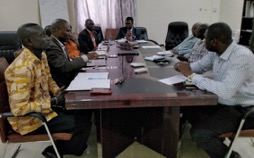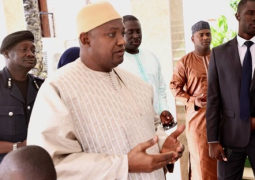
The purpose of the meeting was to familiarise himself with the mandates and responsibilities of the Personnel Management Office (PMO) and how they do their work among other issues of concern to him.
Speaking during the day-long meeting held at the PMO Conference Hall, Minister Joof described the sector as the most important resource the country has (human capital), adding that for the country to develop, the first thing it needs to do is to make sure the country has the human capital in place.
‘‘We must ensure the human capital has the capacity to execute what we are mandated to do in our institutions and also monitor what is going on across the spectrum from Secretary General to the last worker on the payroll,” Minister Joof said.
He advised PMO top officials to have their lenses all the time regarding what is going on in civil service, whether by proxies or doing it by themselves. He also urged them to make sure they are familiar with what is happening in other ministries and the entire public service. “That is the sector‘s job.”
‘‘This is not at all going to exhilarate you from your current responsibility in providing regulatory framework, providing instrument that would make people work. So we will continue do what you are doing, but we need to move further, to ensure people do what we assign them to do, recruit people, design the job specification, push them, promote them and transfer them.”
He echoed that PMO is an important part of public service and it is the engine home for government. “We are responsible for making sure everyone is clear about their job description but not only that, we are also responsible to determine what reward system are in place and what people get rewarded with after doing a good job.”
“As a sector we need to monitor to know those who are delivering and those who are not, then start bringing in incentives, whether negative or positive. The sector also needs to start looking at those who deserve to be compensated in the system and compensate them appropriately, then the country will move forward.”
“If you do a good job in the evening, you expect somebody to thank you. That responsibility is with the PMO and it will remain with the PMO and it is now for me as your minister to know how you are going with these responsibilities for the past few years.”
“You know and I know that we can do better. What we are doing currently and we are the one charged with that responsibility to ensure not that we only do the right thing, but make people do what is expected from them.”
“I‘m here to understand and not here to judge so that as a team, we can set-up what we have to do. Because I will serve as your spokesperson at the Cabinet level. But first, I need to know what PMO has in place; what you have to ensure the task assigned to me by the President on your behalf is understood then we will understand what we have to do, then the bridge between where we are and what we have to do becomes easy for all of us.”
During the meeting, each director within PMO explained their divisions’ main mandates and responsibilities and they promised to support him at all times.





